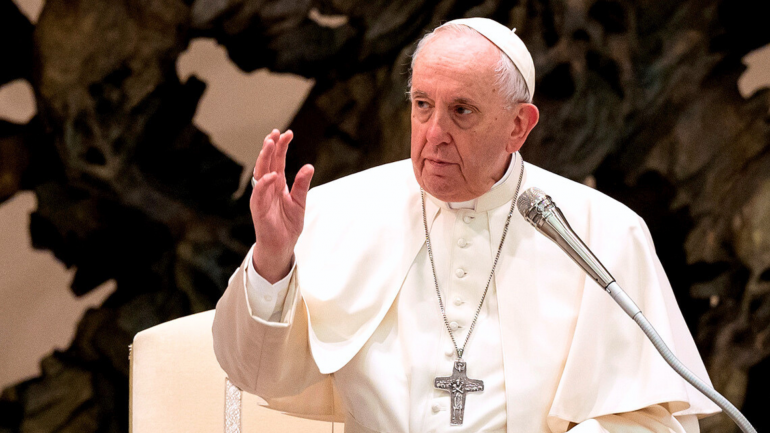Pope Francis calls on communicators to deweaponize language, inspire hope

Pope Francis has encouraged journalists and communicators to disarm the language they use in communicating with the audience.
In his message for the 59th World Communications Day, he said the present time is challenged by disinformation and divisions as a result of massive “data and information” being controlled by a powerful few.
The Pope observed that communication today usually foments fear and despair, encourages prejudice and resentment, and sparks fanaticism and hatred.
“All too often it simplifies reality in order to provoke instinctive reactions,” he said. “It uses words like a razor. It even uses false or artfully distorted information to send messages designed to agitate, provoke or hurt.”
Pope Francis said he had spoken on several occasions of the need to disarm communication and renounce its pugnacity.
“All of us see how – from television talk shows to verbal attacks on social media – there is a risk that the paradigm of competition, opposition, the will to dominate and possess, and the manipulation of public opinion will prevail,” he said.
Reflecting on the Jubilee this year, Pope Francis invited everyone to be “communicators of hope.”
He mentioned a troubling phenomenon that could be referred to as “programmed dispersion of attention” via digital systems.
This phenomenon, which profiles people according to the logic of the market, is capable of modifying people’s perception of reality, Pope Francis said.
“As a result, we witness, often helplessly, a sort of atomization of interests that ends up undermining the foundations of our existence as community, our ability to join in the pursuit of the common good, to listen to one another and to understand each other’s point of view,” he said.
Pope Francis said people make enemies when they disregard the “individuality and dignity” of others when they deliberately insult them, losing the chance to inspire hope.
The pope said he is dreaming of a communication that can make people fellow pilgrims inspiring hope among each other.
“A communication capable of speaking to the heart, arousing not passionate reactions of defensiveness and anger, but attitudes of openness and friendship,” he said. “A communication capable of focusing on beauty and hope even in the midst of apparently desperate situations, and generating commitment, empathy and concern for others. A communication that can help us in “recognizing the dignity of each human being, and in working together to care for our common home.”
Pope Francis encouraged communicators to become witnesses and promoters of non-aggressive communication, and spread the culture of care, build bridges, and dismantle the visible and invisible barriers of today.
“Tell stories steeped in hope, be concerned about our common destiny and strive to write together the history of our future,” he said.
Pope Paul VI initiated the World Communications Day as an annual observance in 1967 following the Second Vatican Council. It encourages reflections on the opportunities and challenges that the media offer and how the Church can better communicate the Gospel.
The 59th World Communications Day, which carries a theme that calls for gentleness, invites the people to "share with gentleness the hope that is in your hearts", communication that creates the condition for dialogue.”
Radio Veritas Asia (RVA), a media platform of the Catholic Church, aims to share Christ. RVA started in 1969 as a continental Catholic radio station to serve Asian countries in their respective local language, thus earning the tag “the Voice of Asian Christianity.” Responding to the emerging context, RVA embraced media platforms to connect with the global Asian audience via its 21 language websites and various social media platforms.














